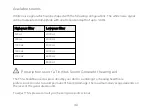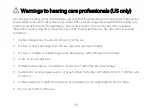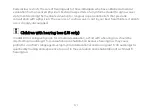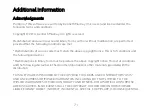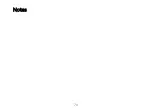
Important notice for prospective hearing aid users (US only)
Good health practice requires that a person with a hearing loss have a medical evaluation by a
licensed physician (preferably a physician who specializes in diseases of the ear) before purchasing
a hearing aid. Licensed physicians who specialize in diseases of the ear are often referred to as
otolaryngologists, otologists or otorhinolaryngologists. The purpose of medical evaluation is to
assure that all medically treatable conditions that may affect hearing are identified and treated
before the hearing aid is purchased.
Following the medical evaluation, the physician will give you a written statement that states that
your hearing loss has been medically evaluated and that you may be considered a candidate for a
hearing aid. The physician will refer you to an audiologist or a hearing care professional, as
appropriate, for a hearing aid evaluation.
The audiologist or hearing care professional will conduct a hearing aid evaluation to assess your
ability to hear with and without a hearing aid. The hearing aid evaluation will enable the audiologist
or hearing care professional to select and fit a hearing aid to your individual needs.
If you have reservations about your ability to adapt to amplification, you should inquire about the
availability of a trial-rental or purchase-option program. Many hearing care professionals now
offer programs that permit you to wear a hearing aid for a period of time for a nominal fee after
which you may decide if you want to purchase the hearing aid.
60



